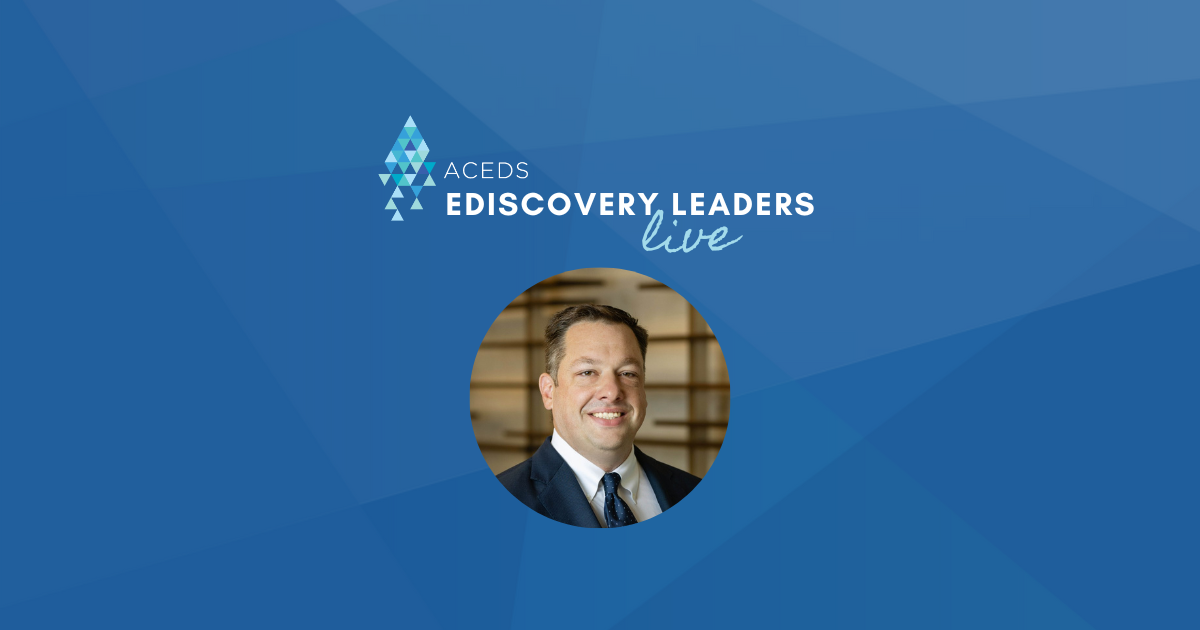eDiscovery Leaders Live: Ryan Tilot of Gunster
Ryan Tilot, Of Counsel at Gunster, joins George Socha, Senior Vice President of Brand Awareness at Reveal, for ACEDS #eDiscoveryLeadersLive at the Georgetown Advanced eDiscovery Institute.
Ryan has over a decade of dedicated eDiscovery and information governance experience from both the litigation and consulting perspectives. He works to identify legally defensible, cost effective, and creative solutions for his clients. Ryan also uses his extensive technical background to inform his legal strategy and counsels on best practices based on his experience as a records manager and solutions architect in the legal industry. He writes and frequently speaks on eDiscovery strategy and technology. Ryan has served as eDiscovery counsel in state and nationwide employment class action litigations and has managed the preparation of electronically stored information (“ESI”) protocol in matters ranging from antitrust actions to products liability litigation.
Ryan discussed his recent move to Gunster as eDiscovery counsel, the group he works with there, why he made the move, and what he is looking forward. Ryan then talked about one of the bigger challenges facing eDiscovery today: dealing with content from collaboration platforms. He also talked about the opportunities those platforms and their content offer, from better ways to identify and collect data, to the more frank communications often found in that content. From there, Ryan turned to TAR, both how it helps merits counsel and issues posed by attempts to use TAR with newer data types.
Key Highlights
- [1:41] Ryan’s new position at Gunster and his role there as eDiscovery counsel.
- [2:54] The group Ryan works in and their areas of focus – eDiscovery and information governance.
- [3:46] Why Ryan moved to Gunster.
- [4:33] The advantages of being at a medium-sized or boutique firm like Gunster.
- [5:39] One of the big issues in the eDiscovery space: collaboration platforms.
- [6:47] Collaboration platform content an opportunity.
- [8:15] An Alice in Wonderland moment? Teams within Teams within Teams.
- [9:09] The Teams interview: using Teams with custodians to get at Teams data.
- [11:08] How litigators are dealing with Slack and the like.
- [13:11] How service providers have been doing, working with Teams and the like.
- [13:57] Ryan’s take on modern attachments.
- [17:58] The discovery challenges and opportunities arising from the ability to edit chats.
- [19:04] The renewed importance of custodial questionnaires.
- [20:28] TAR today: helping the merits team get to what matters better.
- [21:19] TAR today: facing the challenge of handling new data sources from collaboration to chat to emoji.
- [23:37] An exciting time in the industry.
- [24:22] Taking the tools and techniques of eDiscovery into new realms – and merging them together.
Key Quotes
- “[Working with content from collaboration platforms] there’s also that framework that’s there. For example, even with Teams, [it means] using custodial questionnaires, being able to actually talk to and interview the custodians, identifying what chats or groups where they actually communicating in.”
- “For the litigators, there’s great opportunity [with collaboration platform content] because this is a new type of set of data that is being generated, created, on the fly. Email is much more measured oftentimes… But when you are talking about potential issues with Slack or Teams, these are chats, this is contemporaneous thoughts and communications….”
- “One of the strategies that I’ve found is really effective is sitting down on a Teams chat with that custodian, looking at their Teams to identify what are the important conversations that they were having, what documents were being shared.”
- “A lot of times, even though [Teams] is a newer source, it could be quote scarier, I think it also can help you get right to the issues in the case….”
- “What I really like about where TAR is at today is I think we’re at a good place that if you have the right attorneys in place who are on the merits team, reviewing those documents, they’re able then to see much faster what are the important documents, what doesn’t matter. I think you are getting better precision, better efficiency because they have a better handle on what is responsive, what is not responsive, in terms of privilege strategy.”
